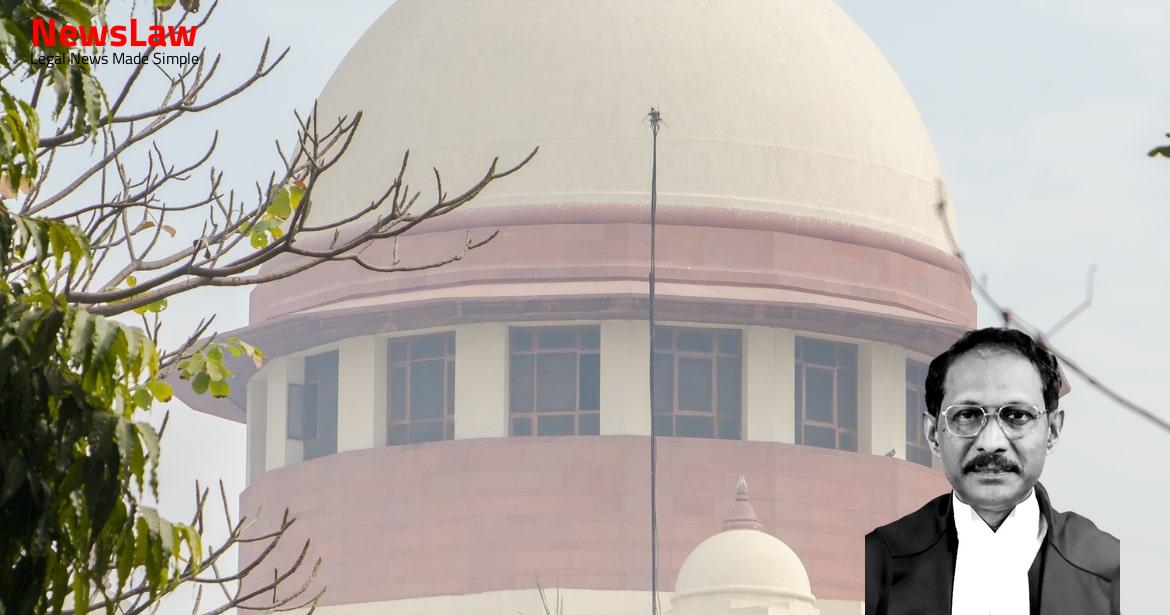Explore the detailed legal analysis conducted by the Court regarding Section 138 of the Act in a recent case. The judgement provides valuable insights into the interpretation of cheque dishonour and the requirements for a debt to be legally enforceable. Understanding the complexities of this legal scenario is crucial for practitioners and enthusiasts alike.
Facts
- First respondent alleged that there was an oral agreement to pay one lakh every three months and eighty thousand in cash, with two cheques given as security.
- First respondent moved an application to amend reply, which was allowed by the High Court.
- Appellant filed a criminal complaint under Section 138 of the Act against the first respondent.
- Appellant accepted that the first respondent had deposited 4,09,315 rupees in his account.
- There is a statutory presumption that the amount in the cheque represents a debt owed by the drawer to the drawee.
- Appellant failed to prove the legally enforceable debt of rupees twenty lakhs.
- Trial Court found that a part of the debt was discharged by the first respondent.
- Notice of demand under Section 138 of the Act deemed invalid.
- First respondent acquitted of the offence under Section 138 as he had paid Rs. 4,09,315 between April 8, 2012 and December 30, 2013.
- High Court affirmed Trial Court’s finding and dismissed the appeal.
- Payments made by the first respondent to the appellant: Rs. 49,315 on 18.04.2012, Rs. 1,20,000 on 05.10.2012, Rs. 60,000 on 15.01.2013, and Rs. 1,20,000 on 10.07.2013.
Also Read: Balancing Power and Transparency: Electoral Bonds Struck Down, Disclosure Mandated
Issue
- The issue at the core of the judgement is whether the offence under Section 138 of the Act is deemed to be committed when the cheque that is dishonoured does not represent an enforceable debt at the time of encashment.
Also Read: Recall of Resolution Plan Approval: Legal Analysis
Arguments
- The term ‘debt or other liability’ in Section 138 of the Act is defined in the Explanation clause.
- Mr. Nakul Dewan, senior counsel for the first respondent, emphasized this definition in his submission.
Analysis
- An offence under Section 138 arises only if the cheque represents a legally enforceable debt at the time of encashment.
- The purpose of Section 138 would be defeated if the dishonour of a security cheque is not included within its purview.
- For the offence under Section 138 to be attracted, the cheque must represent a legally enforceable debt on the date of maturity or presentation.
- If the debtor pays a part or whole of the debt between the drawing and encashment of the cheque, the legally enforceable debt on the date of maturity is affected.
- A statutory notice seeking payment of the entire sum in an unendorsed cheque after part-payment would not be legally sustainable.
- To attract the offence under Section 138, the cheque must represent a legally enforceable debt at the time of encashment.
- If a cheque is dishonoured without representing a legally enforceable debt at the time of encashment, the offense under Section 138 is not made out.
- Part-payments made before encashment affect the legally enforceable debt represented in the cheque.
- If there is a material change where the sum in the cheque does not represent a legally enforceable debt at the time of encashment, the offence under Section 138 is not established.
- The appellant’s claim regarding the issuance and repayment of the twenty lakhs must be considered in conjunction with the cheque provided for security.
- Section 138 of the Act outlines the conditions under which the drawer of a cheque is deemed to have committed an offence.
- The essential ingredients for the offence include a cheque drawn for payment to another person to discharge a debt or liability, the cheque being returned unpaid due to insufficient funds, and the debt or liability being legally enforceable.
- The proviso stipulates further conditions that must be met for the offence to be deemed committed.
- These conditions include presenting the cheque to the bank within six months, the holder of the cheque making a written demand for payment within thirty days of receiving notice of dishonor, and the drawer failing to make payment within fifteen days of receiving the demand.
- A key contention in the case is whether the offence under Section 138 was committed when the amount owed was less than the sum represented in the cheque at the time of presentation.
- The demand has to be made for the ‘said amount’, which is the cheque amount.
- A cheque is issued as security to provide the drawee with leverage in case the drawer fails to pay the debt.
- If the notice demands an amount higher than the cheque amount, validity depends on the language used in the notice.
- Section 138 stipulates that if there is an endorsement on a negotiable instrument for part payment, the instrument may be negotiated for the balance.
- A legally enforceable debt must exist on the date mentioned in the cheque for Section 138 to be applicable.
- Post-dated cheques issued after incurring a debt but before presentation for encashment are covered by Section 138.
- The cheque must represent a correct amount in the notice for it to be valid under Section 138(b).
- The offence under Section 138 is attracted only when the conditions in the provisos have been fulfilled.
- In order to establish an offence under Section 138, the conditions in the provisos must be fulfilled along with the ingredients in the substantive part.
- The first respondent cannot be considered to have committed an offence under Section 138 when the cheque was dishonoured due to insufficient funds.
- The notice demanding payment should refer to the cheque amount, as interpreted by judgments of the Court.
- Since the first respondent did not commit an offence under Section 138, the validity of the notice form is not a deciding factor in this case.
Decision
- Pending application(s) are disposed of.
- The appeal against the judgment of the High Court of Gujarat dated 12 January 2022 is dismissed.
Case Title: DASHRATHBHAI TRIKAMBHAI PATEL Vs. HITESH MAHENDRABHAI PATEL (2022 INSC 1067)
Case Number: Crl.A. No.-001497-001497 / 2022



